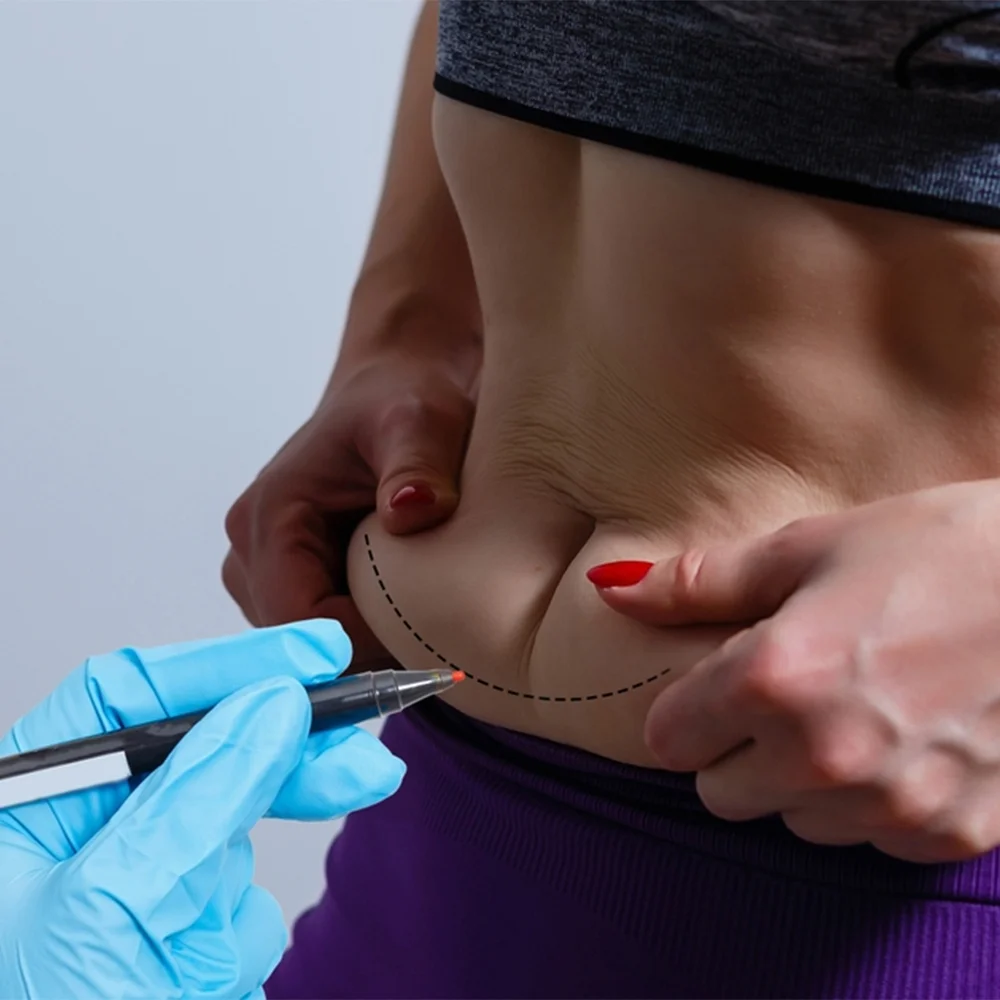Gastric Sleeve
Contact us on Whatsapp for a free quote and consultation from our medical professionals.
What is Gastric Sleeve (Gastrectomy) ?
Gastric sleeve, also known as sleeve gastrectomy, is a surgical weight loss procedure in which a large portion of the stomach is removed to reduce its capacity. The remaining portion of the stomach is shaped like a sleeve or tube, hence the name.
During the procedure, the surgeon makes several small incisions in the abdomen and inserts a laparoscope (a thin tube with a camera attached) to view the inside of the stomach. Then, using specialized surgical instruments, the surgeon removes approximately 80% of the stomach, leaving a small pouch or tube-shaped stomach. This reduces the amount of food the patient can eat, leading to weight loss.
Gastric sleeve surgery is a non-reversible procedure and is usually recommended for people who are severely obese with a body mass index (BMI) of 40 or higher, or those with a BMI of 35-39.9 who have weight-related health problems such as diabetes, high blood pressure, or sleep apnea.


Why Consider Sleeve Gastrectomy Surgery ?
Sleeve gastrectomy surgery may be considered for individuals who are severely obese and have been unable to achieve significant weight loss through non-surgical methods such as diet and exercise. Here are some reasons why someone may consider sleeve gastrectomy surgery:
Weight loss: Sleeve gastrectomy is an effective weight loss procedure, with patients typically losing an average of 60-70% of their excess weight within the first year after surgery. This can lead to significant improvements in overall health and quality of life.
Health benefits: Sleeve gastrectomy can improve or even resolve weight-related health issues such as type 2 diabetes, high blood pressure, sleep apnea, and joint pain. This can reduce the need for medications and improve overall health outcomes.
Long-term results: Studies have shown that sleeve gastrectomy can produce sustained weight loss over the long term, with patients maintaining an average weight loss of 50% or more of their excess weight for up to 10 years after surgery.
Reduced appetite: The removal of a large portion of the stomach reduces the production of ghrelin, a hormone that stimulates appetite. This can help patients feel full and satisfied with smaller meals and reduce cravings for unhealthy foods.
Improved mental health: Many patients experience improved self-esteem, body image, and mental health following sleeve gastrectomy surgery, which can positively impact their overall well-being.
It is important to note that sleeve gastrectomy surgery is a major procedure that carries some risks and potential complications. Therefore, it is important to discuss the potential benefits and risks with a qualified healthcare professional before deciding whether to undergo the procedure.
Lose Weight with Gastric Sleeve Surgery
Gastric sleeve surgery can be an effective tool to help people lose weight and improve their overall health. Here are some ways in which gastric sleeve surgery can promote weight loss:
Reduced stomach capacity: The surgery removes a large portion of the stomach, leaving a smaller stomach pouch that can only hold a small amount of food. This results in the patient feeling full and satisfied with smaller portions of food, leading to a decrease in calorie intake and subsequent weight loss.
Hormonal changes: The part of the stomach that is removed during the surgery produces hormones that regulate hunger and satiety. With the removal of this portion of the stomach, the production of these hormones decreases, leading to reduced hunger and increased feelings of fullness.
Improved food choices: Following the surgery, patients are required to follow a strict diet plan that focuses on high-protein, low-calorie foods. This can help to retrain the patient’s taste buds and promote healthy food choices, which can aid in weight loss.
Increased physical activity: As weight loss occurs, patients often experience increased energy levels and motivation to engage in physical activity. Regular exercise can help to further promote weight loss and improve overall health outcomes.
It is important to note that gastric sleeve surgery is not a quick fix for weight loss and requires a commitment to lifestyle changes to achieve and maintain weight loss over the long term. Patients must adhere to a strict diet plan and exercise regimen, and regularly follow up with their healthcare provider to monitor progress and address any potential complications or concerns.

Gastric Sleeve Surgery Cost
The cost of gastric sleeve surgery can vary depending on various factors, such as the location of the surgery, the surgeon’s experience, and the specific details of the procedure. In the United States, the average cost of gastric sleeve surgery ranges from $10,000 to $20,000. However, the cost may be higher in certain areas, such as urban centers or areas with higher healthcare costs.
It is important to note that the cost of gastric sleeve surgery may also include additional expenses, such as pre-operative testing, hospital fees, anesthesia, and post-operative care. Some insurance plans may cover a portion of the cost of the surgery, while others may not cover it at all.
Patients considering gastric sleeve surgery should research the cost of the procedure in their area and talk to their healthcare provider or insurance company to determine what costs may be covered by their insurance plan. In some cases, financing options may be available to help cover the cost of the surgery over time.
Free Quote
How does a gastric sleeve work ?
Gastric sleeve surgery, also known as sleeve gastrectomy, works by reducing the size of the stomach to limit the amount of food a person can eat at one time. The procedure involves removing a large portion of the stomach to create a smaller, sleeve-shaped stomach.
During the surgery, the surgeon makes several small incisions in the abdomen and inserts a laparoscope, which is a thin tube with a camera attached, to view the inside of the stomach. Then, using specialized surgical instruments, the surgeon removes approximately 80% of the stomach, leaving a small, tube-shaped stomach.
With the smaller stomach, patients feel full and satisfied with smaller amounts of food, which can help to reduce calorie intake and promote weight loss. Additionally, the removal of a portion of the stomach can lead to a decrease in the production of ghrelin, a hormone that stimulates appetite, leading to reduced hunger and increased feelings of fullness.
Following the surgery, patients are required to follow a strict diet plan and exercise regimen to achieve and maintain weight loss over the long term. It is important to note that gastric sleeve surgery is a major procedure that carries some risks and potential complications, and it is important to discuss the potential benefits and risks with a qualified healthcare professional before deciding whether to undergo the procedure.


How Does Gastric Sleeve Work to Promote Weight Loss ?
Gastric sleeve surgery promotes weight loss through several mechanisms:
Reduced stomach capacity: The surgery removes a large portion of the stomach, leaving a smaller stomach pouch that can only hold a small amount of food. This results in the patient feeling full and satisfied with smaller portions of food, leading to a decrease in calorie intake and subsequent weight loss.
Hormonal changes: The part of the stomach that is removed during the surgery produces hormones that regulate hunger and satiety. With the removal of this portion of the stomach, the production of these hormones decreases, leading to reduced hunger and increased feelings of fullness.
Improved food choices: Following the surgery, patients are required to follow a strict diet plan that focuses on high-protein, low-calorie foods. This can help to retrain the patient’s taste buds and promote healthy food choices, which can aid in weight loss.
Increased physical activity: As weight loss occurs, patients often experience increased energy levels and motivation to engage in physical activity. Regular exercise can help to further promote weight loss and improve overall health outcomes.
Reduction in obesity-related health issues: Gastric sleeve surgery can also lead to improvements in obesity-related health issues such as type 2 diabetes, high blood pressure, sleep apnea, and joint pain. This can reduce the need for medications and improve overall health outcomes.
It is important to note that gastric sleeve surgery is not a quick fix for weight loss and requires a commitment to lifestyle changes to achieve and maintain weight loss over the long term. Patients must adhere to a strict diet plan and exercise regimen, and regularly follow up with their healthcare provider to monitor progress and address any potential complications or concerns.
Is Gastric Sleeve (Gastrectomy) surgery right for you ?
Deciding whether gastric sleeve surgery is right for you is a personal decision that should be made in consultation with your healthcare provider. Here are some factors to consider when making this decision:
Body Mass Index (BMI): Gastric sleeve surgery is typically recommended for patients with a BMI of 40 or higher, or a BMI of 35 or higher with obesity-related health issues such as type 2 diabetes, high blood pressure, or sleep apnea.
Previous weight loss attempts: If you have tried other weight loss methods such as diet and exercise and have not achieved long-term success, gastric sleeve surgery may be a viable option.
Health issues related to obesity: If you have obesity-related health issues such as type 2 diabetes, high blood pressure, or sleep apnea, gastric sleeve surgery may improve or resolve these conditions.
Commitment to lifestyle changes: Gastric sleeve surgery is not a quick fix for weight loss and requires a commitment to lifestyle changes such as a healthy diet and regular exercise to achieve and maintain weight loss over the long term.
Potential risks and complications: As with any surgery, there are potential risks and complications associated with gastric sleeve surgery, including bleeding, infection, and blood clots. It is important to discuss these risks with your healthcare provider and weigh them against the potential benefits of the surgery.
Ultimately, the decision to undergo gastric sleeve surgery should be made in consultation with your healthcare provider, who can help you determine if the surgery is right for you based on your individual health status and weight loss goals.

How Does a Sleeve Gastrectomy (Gastric sleeve) Work ?
A sleeve gastrectomy, also known as a gastric sleeve surgery, works by removing a large portion of the stomach to create a smaller, tube-shaped stomach. The procedure is typically performed using minimally invasive techniques such as laparoscopy, which involves making several small incisions in the abdomen and using specialized surgical instruments to remove a portion of the stomach.
During the surgery, the surgeon removes approximately 80% of the stomach, leaving a small, sleeve-shaped stomach that can hold only a small amount of food. This smaller stomach reduces the amount of food that can be consumed at one time and promotes feelings of fullness and satiety with smaller portions of food.
In addition to reducing the stomach size, a sleeve gastrectomy also removes a portion of the stomach that produces a hormone called ghrelin, which stimulates hunger. By removing this portion of the stomach, the production of ghrelin decreases, leading to reduced appetite and food intake.
Following the surgery, patients are required to adhere to a strict diet and exercise plan to promote weight loss and ensure optimal healing. Over time, patients typically experience significant weight loss and improvements in obesity-related health issues such as type 2 diabetes, high blood pressure, and sleep apnea.
It is important to note that a sleeve gastrectomy is a major surgery and carries some risks and potential complications. Patients should discuss the potential benefits and risks with their healthcare provider and carefully consider all options before deciding whether to undergo the surgery.
When Does the Effect of Gastric Sleeve Begin
The effect of gastric sleeve surgery typically begins immediately following the procedure, as patients experience a significant reduction in stomach size and a decrease in appetite. The smaller stomach size limits the amount of food that can be consumed at one time, leading to feelings of fullness and satiety with smaller portions of food. This results in a decrease in calorie intake, which can lead to significant weight loss over time.
In the immediate postoperative period, patients are typically placed on a liquid diet for a few days, followed by a gradual transition to solid foods over several weeks. During this time, patients must adhere to strict dietary guidelines to ensure proper healing and promote weight loss.
While weight loss can begin immediately following the surgery, the rate and amount of weight loss vary depending on several factors, including the patient’s starting weight, diet and exercise habits, and overall health status. It is important to note that gastric sleeve surgery is not a quick fix for weight loss and requires a commitment to lifestyle changes such as healthy eating habits and regular exercise to achieve and maintain weight loss over the long term.
Patients typically experience the greatest amount of weight loss in the first 12 to 18 months following the surgery, with weight loss continuing for up to two years or more. The amount of weight loss varies by individual, but patients can expect to lose an average of 60-70% of their excess weight within the first two years following the surgery.

Making the Right Choice for Gastric Sleeve Surgery
Making the decision to undergo gastric sleeve surgery is a personal one that should be made after careful consideration and consultation with your healthcare provider. Here are some things to keep in mind when making this decision:
Understand the risks and benefits: Like any surgery, gastric sleeve surgery carries risks and potential complications. It’s important to understand these risks and weigh them against the potential benefits of the surgery, including significant weight loss and improvements in obesity-related health issues such as type 2 diabetes, high blood pressure, and sleep apnea.
Consider your weight loss goals: Gastric sleeve surgery can be an effective tool for weight loss, but it is not a quick fix. It requires a commitment to lifestyle changes such as healthy eating habits and regular exercise to achieve and maintain weight loss over the long term. Consider your weight loss goals and whether you are willing to make these lifestyle changes.
Talk to your healthcare provider: Your healthcare provider can help you determine whether gastric sleeve surgery is right for you based on your individual health status and weight loss goals. They can also provide information on the risks and benefits of the surgery and help you make an informed decision.
Consider the cost: Gastric sleeve surgery can be expensive, and insurance coverage varies. Be sure to consider the cost of the surgery and whether it is financially feasible for you.
Prepare for the surgery: If you decide to undergo gastric sleeve surgery, it’s important to prepare yourself physically and mentally for the procedure and the lifestyle changes that will be required afterward. This may include losing some weight before the surgery, adhering to a specific diet and exercise plan, and making lifestyle changes that will promote weight loss and improve your overall health.
Ultimately, the decision to undergo gastric sleeve surgery should be made in consultation with your healthcare provider, who can provide guidance and support throughout the process.
Achieving a Healthier Life with Sleeve Gastrectomy
Sleeve gastrectomy, also known as gastric sleeve surgery, can be an effective tool for achieving a healthier life by promoting significant weight loss and improving obesity-related health issues such as type 2 diabetes, high blood pressure, and sleep apnea. Here are some ways in which sleeve gastrectomy can help you achieve a healthier life:
Promotes significant weight loss: Sleeve gastrectomy significantly reduces the size of the stomach, limiting the amount of food that can be consumed at one time and promoting feelings of fullness and satiety with smaller portions of food. This leads to a decrease in calorie intake, which can result in significant weight loss over time.
Improves obesity-related health issues: Sleeve gastrectomy has been shown to improve obesity-related health issues such as type 2 diabetes, high blood pressure, and sleep apnea. This is because weight loss can lead to improvements in these conditions, reducing the need for medication and improving overall health and quality of life.
Encourages healthier lifestyle habits: Sleeve gastrectomy requires a commitment to lifestyle changes such as healthy eating habits and regular exercise to achieve and maintain weight loss over the long term. This can encourage patients to adopt healthier lifestyle habits that promote overall health and well-being.
Boosts self-esteem and confidence: Significant weight loss can improve self-esteem and confidence, leading to a more positive outlook on life and improved mental health.
Improves mobility: Excess weight can place strain on joints and limit mobility. Weight loss resulting from sleeve gastrectomy can improve joint health and mobility, allowing patients to be more active and enjoy a better quality of life.
It’s important to note that sleeve gastrectomy is a major surgery and carries some risks and potential complications. Patients should discuss the potential benefits and risks with their healthcare provider and carefully consider all options before deciding whether to undergo the surgery. However, for many patients, sleeve gastrectomy can be an effective tool for achieving a healthier life and improving overall health and well-being.


Find the best Weight Loss & Bariatric Surgeons in Turkey
To find the best weight loss and bariatric surgeons in Turkey, you can take the following steps:
Research online: Look for weight loss and bariatric surgery clinics in Turkey online. Check their websites, read patient reviews, and find out about their surgeons and their credentials.
Ask for recommendations: Ask your family and friends if they know of any reputable weight loss and bariatric surgery clinics in Turkey. If they have undergone bariatric surgery themselves, they may be able to recommend a good surgeon.
Consult with your healthcare provider: Your healthcare provider may be able to refer you to a reputable weight loss and bariatric surgery clinic in Turkey. They may also be able to provide you with information about the credentials and experience of the surgeons at these clinics.
Check for accreditation: Look for clinics that have been accredited by recognized organizations such as the International Society for Quality in Health Care (ISQua) or the Joint Commission International (JCI). Accreditation ensures that the clinic meets certain standards of quality and safety.
Research the surgeon’s credentials: Look for surgeons who are board-certified in bariatric surgery and have extensive experience in performing weight loss and bariatric surgeries.
Aesthetic Airways for Bariatric Surgery, Leaders in weight loss surgery for over 25 years
Bariatric surgery is a surgical procedure that is used to treat obesity and its associated health problems. It involves reducing the size of the stomach and/or rerouting the digestive system to limit the amount of food that can be consumed and/or absorbed. The goal of bariatric surgery is to promote significant weight loss and improve obesity-related health issues such as type 2 diabetes, high blood pressure, and sleep apnea.
There are several types of bariatric surgery, including sleeve gastrectomy, gastric bypass, adjustable gastric banding, and biliopancreatic diversion with duodenal switch. The choice of surgery depends on factors such as the patient’s weight, health status, and individual needs and preferences.
It’s important to note that bariatric surgery is a major surgery and carries some risks and potential complications. Patients should discuss the potential benefits and risks with their healthcare provider and carefully consider all options before deciding whether to undergo the surgery. However, for many patients, bariatric surgery can be an effective tool for achieving significant weight loss and improving overall health and well-being.

